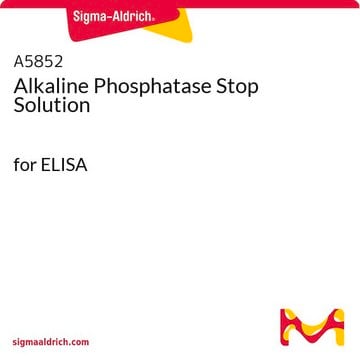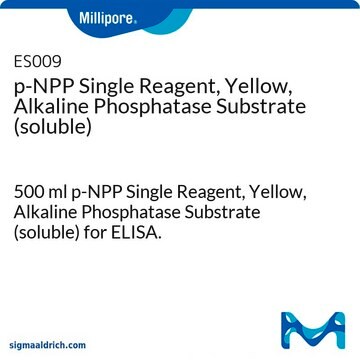S0942
Substrat de phosphatase
chromogenic, tablet (round)
Synonyme(s) :
Phosphate de 4-nitrophényle disodium salt hexahydrate, pNPP disodium salt hexahydrate
About This Item
Produits recommandés
product name
Substrat de phosphatase, 5 mg tablets
Forme
tablet (round)
Température de stockage
−20°C
Chaîne SMILES
O.O.O.O.O.O.[Na+].[Na+].[O-][N+](=O)c1ccc(OP([O-])([O-])=O)cc1
InChI
1S/C6H6NO6P.2Na.6H2O/c8-7(9)5-1-3-6(4-2-5)13-14(10,11)12;;;;;;;;/h1-4H,(H2,10,11,12);;;6*1H2/q;2*+1;;;;;;/p-2
Clé InChI
KAKKHKRHCKCAGH-UHFFFAOYSA-L
Vous recherchez des produits similaires ? Visite Guide de comparaison des produits
Catégories apparentées
Application
Autres remarques
Code de la classe de stockage
11 - Combustible Solids
Classe de danger pour l'eau (WGK)
WGK 3
Point d'éclair (°F)
Not applicable
Point d'éclair (°C)
Not applicable
Équipement de protection individuelle
Eyeshields, Gloves, type N95 (US)
Certificats d'analyse (COA)
Recherchez un Certificats d'analyse (COA) en saisissant le numéro de lot du produit. Les numéros de lot figurent sur l'étiquette du produit après les mots "Lot" ou "Batch".
Déjà en possession de ce produit ?
Retrouvez la documentation relative aux produits que vous avez récemment achetés dans la Bibliothèque de documents.
Les clients ont également consulté
Articles
NBT-BCIP substrate system aids in western blotting and immunohistological staining, producing a blue-purple insoluble end product.
Notre équipe de scientifiques dispose d'une expérience dans tous les secteurs de la recherche, notamment en sciences de la vie, science des matériaux, synthèse chimique, chromatographie, analyse et dans de nombreux autres domaines..
Contacter notre Service technique






